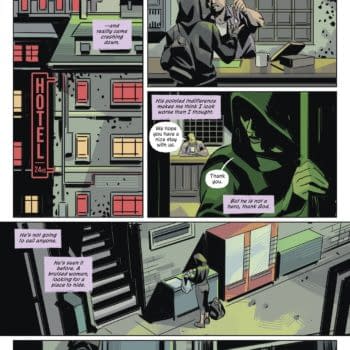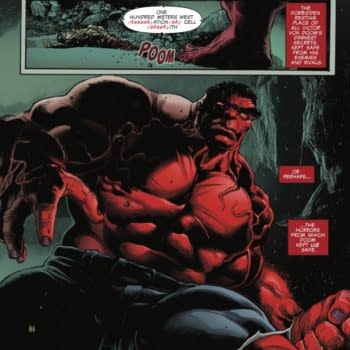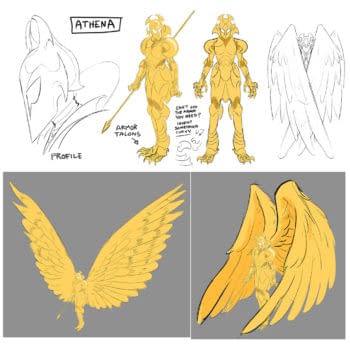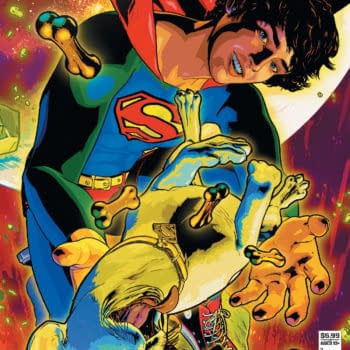Posted in: Comics | Tagged: Comics, Dynamite Entertainment, j. michael straczynski, tony lee, twilight zone
Straczynski Talks Returning To Twilight Zone After 25 Years
J. Michael Straczynski is known for creating Babylon 5 and Joe's Comics, but back in 1988 he was a writer on the Twilight Zone TV series. Now, 25 years later, he returns to the Rod Serling creation with Twlight Zone #1 from Dynamite Entertainment. Tony Lee chatted with Straczynski about the project.

J. MICHAEL STRACZYNSKI: Probably the main consequence of working on the '88 Twilight Zone is that it really helped me to codify in my own head what is and isn't a Zone story. When you sit down to actually work in that universe, there's a certain amount of reinventing the wheel that goes on initially. Which is why when freelancers came in the pitches would almost always end with "…and we discover they're robots!" or "they're Adam and Eve!" or "they're really dead!" Being immersed in that world helps you to avoid all the obvious stories and look for ones that are a bit more challenging and come at the characters from an oblique angle.
TL: As a long term fan of the series, what's your earliest or most stand-out memory of it?
JMS: I've been trying to remember the first Zone I ever saw, and I believe it was "Walking Distance," though I wouldn't swear to that under oath.
The thing that struck me about the show was the speed and strength with which it could establish a main character and pull you into the story. Strongly defined characters were at the very core of the show.
If there was any one element that kept drawing me back, it was the writing: punchy, sharp, incisive, brave enough to park the camera and let the character just talk for a while. Good writing. Amazing writing.
There were three key to the show: a tightly constructed character, who was b) often running from or to something, so he was already in motion, and c) in a situation that he could not explain to others or understand himself.
TL: At San Diego, you stated that you wanted to write the series as stand alone arcs connected by theme, character and location. What made you decide to do it this way rather than as one shots or even two parters?
JMS: A 22 page comic doesn't equate to 22 minutes of television. If you pull out a comic script and format it for TV, it's actually only about 10 minutes of material, give or take. So you need roughly 3 issues to equal one half-hour episode, which is why some of those who suggest these should be all done in one issues are coming at this from the wrong side of the coin. A zone episode needs proper character and story development, and you can't get that in 10 minutes…hence, the use of multiple issue arcs.
TL: You're on board for at least the first twelve issues, what can readers look forward to in this series? What surprises can we look forward to?
JMS: Probably the most interesting part, and certainly the most challenging from a writing perspective, is that these are three independent stories with overlapping characters that stand totally on their own…but which over time, in the aggregate, begin to comment upon and affect the other two stories.
It's like writing three stories made of playing cards, which can be laid out in one way, then shuffled into a completely different order, layering one into the next, and it still works. Pulling that off has been very difficult in terms of maintaining the chronology…I have spread-sheets and calendars spread all over my desk to keep track of it all — but in the end, it should be very cool.
TL: You're one of the few writers out there who's managed to successfully straddle multiple mediums and genres – what's next for you, and what medium will it be in?
JMS: I've been ridiculously fortunate in my career. The average career for a TV writer is ten years; by the end of that time, the town has pretty seen what you have to offer, they've defined you, you've defined yourself, and the doors start to close. In a couple of years I will have been working in TV on and off for 30 years, and that's damned improbable.
I think the key to survival in the business is doing just what you mention: work in multiples mediums and genres, learn from each one and apply those lessons elsewhere. Writing a comic hones your visual sensibilities, which you can use in a feature; a drama series gives you training in character moments you can use in a comic. It all feeds into everything else, and stops anyone from putting you in a box…because once you're in that box, they bury you in it.
In terms of the future…I'm always looking for new challenges. In TV there's nowhere to go within the structure of the form once you've been a show-runner. You can do more shows, better or different shows, but there's noplace higher on the chart than show-runner. In film, once you've written movies that have hit half a billion dollars or earned Oscar or BAFTA nominations, you've gone as far as you can as a writer in that respect; more movies, yes, better and different movies, sure. But logistically, organizationally, you've gone about as far as you can.
So I'm moving a bit more into directing. I don't want to direct full-time…hate getting up early…but for the occasional project, it's worth it. I was going to be directing my first feature this fall, but we pushed it to winter '14 to accommodate actors schedules and make room for Sense8, the series I'm doing for Netflix with the Wachowskis. But even there I'm slated to direct the episodes we're doing in London. So yeah, directing is the next big challenge.
TL: And finally – what's your favourite Twilight Zone episode?
JMS: "The Obsolete Man" for reasons that would take pages and pages to explain.
Tony Lee is currently working on Battlestar Galactica for Dynamite Entertainment, a four-part mini-series focused on the cigar-smoking ladies man Starbuck. Tony is a #1 New York Times Best Selling Author of comics, screenplays and audio dramas – including both Tenth and Eleventh Doctor ongoing Doctor Who series for IDW, The Gloom and Agent Mom for MTV, Superboy for DC Comics, Spider Man for Marvel and a series of Dorian Gray, Doctor Who and Bernice Summerfield audio dramas for Big Finish.
In 2011 his graphic novel Hope Falls was optioned for film through Future Films, with Tony writing the screenplay. In 2012 his graphic novel Danger Academy was announced as being developed into a television series for American television.
His movie The Mild Bunch is in development with DLT Entertainment and his web series GODFather is due for release in 2014. He is currently working on a US television series with MacGyver show creator Lee David Zlotoff, and with a Hollywood production company on an upcoming movie franchise among other projects.

















